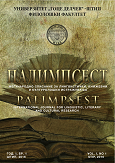THE ROLE OF CALL IN FOSTERING LEARNER AUTONOMY ‒ A STUDY CONDUCTED AT SOUTH EAST EUROPEAN UNIVERSITY IN TETOVO
THE ROLE OF CALL IN FOSTERING LEARNER AUTONOMY ‒ A STUDY CONDUCTED AT SOUTH EAST EUROPEAN UNIVERSITY IN TETOVO
Author(s): Brikena Xhaferi, Gëzim XhaferiSubject(s): School education, Higher Education , Pedagogy
Published by: Универзитет »Гоце Делчев« - Штип
Keywords: learner autonomy; university; CALL; teacher role; student attitudes
Summary/Abstract: In the field of second and foreign language teaching and learning, as the theory and practice of language teaching enters a new century, the importance of helping students to be more autonomous is becoming a major concern of many teachers and educators. There are several tools that can promote learner autonomy, and computer assisted language learning (CALL) is one of them. Many studies have shown that computers have positive effect on increasing students’ interest in learning and make them stay longer on the tasks given by the teacher. Similarly, Littlemore (2001) stated that new technologies, e.g. computers, the Internet, multimedia, language laboratories and video can help develop learner autonomy. Also, computer technology can provide the students with the means to control their own learning, to construct meaning and to evaluate and monitor their own performance (Smith, 2004). The present study aims to investigate students’ attitudes towards the use of CALL in their learning, its impact on promoting learner autonomy and the teachers’ role in this process. The study uses three instruments: student questionnaire, teacher interview and learner diary. The study results based on learner diaries and students’ questionnaire responses showed that CALL has the potential to increase learner autonomy because students are able to direct their own learning, take control over their learning, assess their learning, feel more responsible in selecting online-materials, and the motivation is higher than in regular classes. Teachers’ interviews showed that teachers perceive their role as a facilitator, guide and counselor in promoting learner autonomy.
Journal: Палимпсест, Меѓународно списание за лингвистички, книжевни и културолошки истражувања
- Issue Year: 1/2016
- Issue No: 1
- Page Range: 259-266
- Page Count: 8
- Language: English

